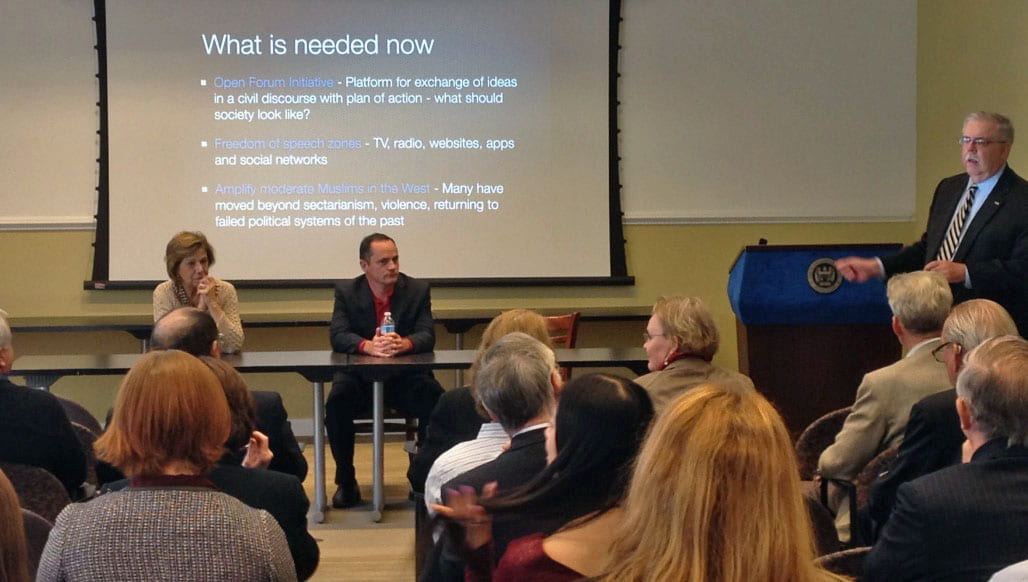WASHINGTON – The propaganda spread by ISIS is more powerful and sophisticated than Al Qaeda’s media messages of just a few years ago. So now, “journalism alone” is not sufficient for the U.S. to combat the Islamic state’s media campaign.
That was the message from two U.S. international broadcasting executives, Shameem Rassam, Executive Producer of Alhurra Iraq, and Davin Hutchins, Director of Digital Content for the Middle East Broadcasting Networks, at Monday’s CCLP Communication Leadership Forum in Washington, D.C.

Left to right: Shameem Rassam, Davin Hutchins, and Donald Bishop, President of the Public Diplomacy Council.
Where Al Qaeda relied on Al Jazeera and other media outlets to spread its message, according to Hutchins, ISIS now broadcasts its messages directly, using social networks. And instead of Al Qaeda’s crudely produced videos featuring Osama bin Laden, Hutchins noted ISIS has slick, professional productions that focus on “crimes, exploits [and] brutality.”
Now, according to Hutchins, the U.S. must start with solid journalism, reporting on “root causes of the ISIS phenomenon among youth” including unemployment, poor education, minority rights, sectarianism and “religious literalism.”
But Hutchins said “journalism alone” is no longer sufficient: U.S. international broadcasters must provide platforms for “social engagement” to embrace the audience for feedback and viewpoints. Hutchins called it “more future tense,” featuring Muslims who are “condemning or ridiculing ISIS… Muslims who disagree with ISIS is a whole beat.”
“You have to listen to the audience to create compelling content,” he added. “People want to see themselves.”
According to Hutchins, this is no different from the evolving content at the New York Times and The Washington Post, which have both started to publish more features that engage readers directly.
“You can’t just write for the front page anymore,” he added.
Rassam said the broadcasts she supervises have a special emphasis on youth and “the increasing number of displaced people” forced to flee advancing ISIS forces. She also described a special program on Iraqi songs and culture, featuring the associate director of Iraq’s Symphony Orchestra along with a poet and lyricist.
But Rassam said ISIS has been “working in the streets for a year,” and the U.S. is struggling to catch up.
Nevertheless, Rassam claimed Alhurra now has the highest-audience newscast in Iraq. And Hutchins said that in the Syrian refugee camps, U.S. international broadcasting regularly reaches 35% of the people with Alhurra, Radio Sawa and new Sawa online and cell phone apps, adding that data show 60% of the refugees are aware of American broadcast channels and apps.
Monday’s CCLP Washington Communication Leadership forum was part of a monthly series of lunch forums presented in partnership with the USC Center on Public Diplomacy and the Public Diplomacy Council.
The next forum, on November 3rd, will feature Bruce Gregory, Adjunct Professor in Georgetown University’s Master of Science in Foreign Service Program, discussing his report on new challenges to public diplomacy. Details and RSVP information are here.